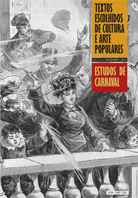AS ESCOLAS DE SAMBA E OS MOVIMENTOS NEGROS NOS ANOS 1960: UMA PÁGINA EM BRANCO NA HISTORIOGRAFIA BRASILEIRA
DOI:
https://doi.org/10.12957/tecap.2014.16250Palavras-chave:
ESCOLAS DE SAMBA, MOVIMENTOS NEGROS, REPRESENTAÇÕES SOCIAISResumo
<doi>10.12957/tecap.2014.16250
Os desfiles das agremiações cariocas nos anos 60 estavam inseridos no quadro de transformações culturais, revelando embates, lutas e disputas por espaços políticos e sociais. O objetivo desta comunicação é compreender como a temática da cultura negra era trabalhada pelas escolas no período. A partir das matérias do Jornal do Brasil, destaquei os enredos, sambas e as narrativas da história dos negros no Brasil. As escolas eram agremiações culturais sintonizadas nos debates da militância, embora consideradas manifestações folclóricas, sendo ignoradas pelas lideranças e organizações, o que se refletiu em importante lacuna na historiografia sobre o movimento negro brasileiro daquela década.
Downloads
Publicado
2014-11-01
Como Citar
Faria, G. J. M. (2014). AS ESCOLAS DE SAMBA E OS MOVIMENTOS NEGROS NOS ANOS 1960: UMA PÁGINA EM BRANCO NA HISTORIOGRAFIA BRASILEIRA. Textos Escolhidos De Cultura E Arte Populares, 11(2). https://doi.org/10.12957/tecap.2014.16250
Edição
Seção
Artigos
Licença
Autores que publicam nesta revista concordam com os seguintes termos:- Autores mantém os direitos autorais e concedem à revista o direito de primeira publicação, com o trabalho simultaneamente licenciado sob a Licença Creative Commons Attribution que permite o compartilhamento do trabalho com reconhecimento da autoria e publicação inicial nesta revista.
- Autores têm autorização para assumir contratos adicionais separadamente, para distribuição não-exclusiva da versão do trabalho publicada nesta revista (ex.: publicar em repositório institucional ou como capítulo de livro), com reconhecimento de autoria e publicação inicial nesta revista.
- Autores têm permissão e são estimulados a publicar e distribuir seu trabalho online (ex.: em repositórios institucionais ou na sua página pessoal) a qualquer ponto antes ou durante o processo editorial, já que isso pode gerar alterações produtivas, bem como aumentar o impacto e a citação do trabalho publicado (Veja O Efeito do Acesso Livre).

